Chapter 18: Exploring the Jungle, Part 1
By Boat and Truck to Nieva
AS TOLD BY JOHN AGERSTEN
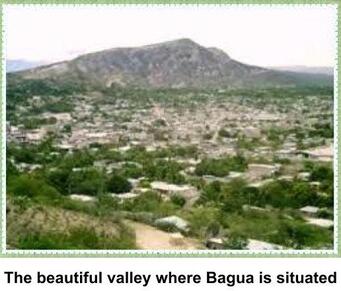
The second week of March of ‘69, just shortly after returning from the shorter trip into the jungle, I was getting ready to make another trip. Of course, it was hard to leave Gro and the children again,but we both trusted God to take care of all of us. In a letter home to her parents, Gro writes:
“You're wondering if I live alone in this house while John is traveling. I do, but I actually feel safe here. It can be a little lonely, but the children keep me busy. I always have something to do, both preparing for Sunday school and the services here, and besides that, there is the regular housework. Occasionally I visit some of the ladies in the congregation, and sometimes they come here. José Placencia and his wife, our friends who helped us find the house, have built a good house right up the street from where we live. I spend quite a bit of time with them when John is traveling, and they are a great help to me. I also currently have the daughter of the owner of the house living here with me. She really wanted to learn to sew on an electric machine. They have an old treadle machine where they live in the country. She was afraid to sleep alone in the room with the separate entrance, the one that her parents use when they are in town, so we moved her bed into our part of the house. She also helps me a little with the kids and the cooking, but she is only here for a short time. A young girl from the Nazarene Church comes and helps me for a few hours with housework now and then.
“You're wondering if I live alone in this house while John is traveling. I do, but I actually feel safe here. It can be a little lonely, but the children keep me busy. I always have something to do, both preparing for Sunday school and the services here, and besides that, there is the regular housework. Occasionally I visit some of the ladies in the congregation, and sometimes they come here. José Placencia and his wife, our friends who helped us find the house, have built a good house right up the street from where we live. I spend quite a bit of time with them when John is traveling, and they are a great help to me. I also currently have the daughter of the owner of the house living here with me. She really wanted to learn to sew on an electric machine. They have an old treadle machine where they live in the country. She was afraid to sleep alone in the room with the separate entrance, the one that her parents use when they are in town, so we moved her bed into our part of the house. She also helps me a little with the kids and the cooking, but she is only here for a short time. A young girl from the Nazarene Church comes and helps me for a few hours with housework now and then.
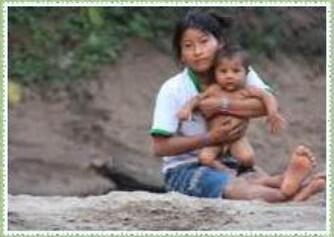
The other day I was visited by a young, married lady who has a little five year old girl and a small baby just a couple of months old. She told me she had given birth to four children between these two, including a set of twins. Three of the children died when they were 6-7 months old , and the most recent death was that of an almost two year old baby. It is so tragic! Poverty and malnutrition have consequences! She herself is pale and thin and is barely able to produce milk , so she gives the baby sugar water as well. Buying milk is a luxury here. It's expensive compared to what they earn, and its also difficult to find. Now I periodically give her cans of powdered milk along with instructions on how to boil the water and bottles, etc. I hope it will give the baby enough nourishment to grow up. I can not bear to think that maybe this child too will die of malnutrition. Unfortunately, many other families are in the same situation. May God touch the hearts of people for the needy in the world. There is a lot of injustice! ”
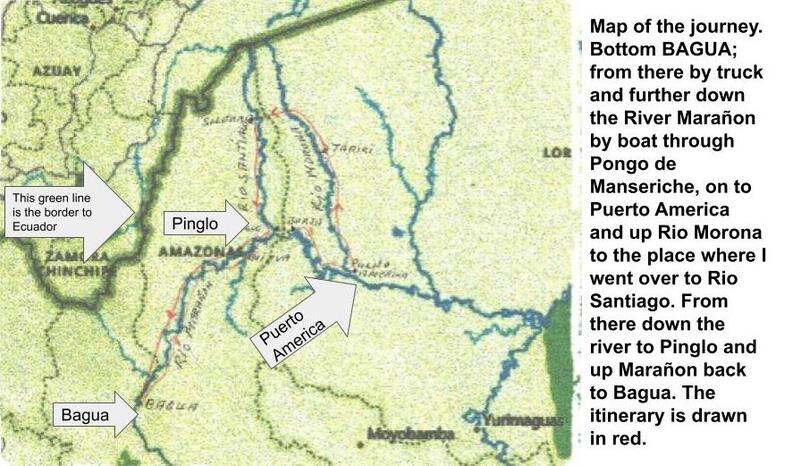
Knowing I had Gro’s full support, I prepared for this longer trip into the jungle. Packing took a lot of thought: all I could bring were the essentials: a couple of changes of clothes, an extra pair of shoes, toiletries, a towel, sheets, and a flashlight. A mosquito net, an air mattress, some canned food, soup bags, a small pot, a deep plate, a spoon, and a pocket knife were also needed. Everything was packed in just one bag and a sleeping bag cover. I kept money in a small fabric bag sewn for the occasion, fastened with safety pins on the inside of my pants. Everything was ready for departure into the great unknown. The jungle and its inhabitants were waiting
On the way to Chiriaco
March 9th, I went down to the crossroads to wait for a car ride to Chiriaco. While I was waiting, I had plenty of time to think about what I was setting out to do. The purpose of the trip was to explore an area down the Marañon River on the east side of «Pongo de Manseriche ” to see what needs and opportunities there were for missionary work among the people who lived there. Pongo de Manseriche is the rapids where the Marañon river is squeezed for the last time through the easternmost foothills of the Andes, and then flow down into large bends and calmer currents through the flat, green Amazon jungle. From what we had heard, there was no regular missionary work in this area where indigenous tribes and the mestizos (mixture of indigenous and Spanish people) live in small villages and solitary houses along the Marañon river and the countless small and large rivers that flow into it.
On the way to Chiriaco
March 9th, I went down to the crossroads to wait for a car ride to Chiriaco. While I was waiting, I had plenty of time to think about what I was setting out to do. The purpose of the trip was to explore an area down the Marañon River on the east side of «Pongo de Manseriche ” to see what needs and opportunities there were for missionary work among the people who lived there. Pongo de Manseriche is the rapids where the Marañon river is squeezed for the last time through the easternmost foothills of the Andes, and then flow down into large bends and calmer currents through the flat, green Amazon jungle. From what we had heard, there was no regular missionary work in this area where indigenous tribes and the mestizos (mixture of indigenous and Spanish people) live in small villages and solitary houses along the Marañon river and the countless small and large rivers that flow into it.
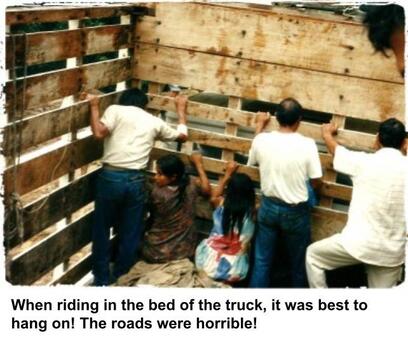
At the crossroads, all the cars were turning in to Bagua Chica, and there seemed to be little traffic going my way. Finally, a large truck stopped. There were others waiting that wanted to travel the same way, and they rushed foreward with their bundles and threw them up on the bed of the truck. Suddenly a squeal could be heard from one of the bundles, and it turns out that it contained a little piglet! I managed to get on with my luggage as well. I tried to find a place to stand and hopefully occasionally be able to sit in between all the other passengers and their bundles of various kinds.
The truck started with a jerk, so that the passengers that did not have a good grip on something, fell onto the bottom of the truck bed. Some of my fellow passengers were on their way home from Bagua Chica with their newly purchased items, and two of the men had probably used a good portion of their money on alcohol. It didn’t take long before they were sound asleep in different corners.
After driving for about an hour, the truck stopped at a barrier next to a military station. Everyone had to get out and have their personal documents checked before we were cleared to continue our bumpy and dusty journey. Some of the passengers started jumping off as we reached their little fields and huts in the jungle, and some got off by small paths that lead to their new clearings. Still other passengers climbed on. We were driving along the Marañon river and I enjoyed watching it. Where the river flowed gently along smooth stretches, we drove right next to it. But then the river course would narrow, the terrain became hilly and the river would start to boil, throwing itself down rapids and small waterfalls. At these places, the road usually went further up the slopes to get over the hilltops.Gradually the landscape flattened out, and we had come to the end of the road. After riding for four hours on the truck bed, it felt good to stretch my sore and stiff legs.
The truck started with a jerk, so that the passengers that did not have a good grip on something, fell onto the bottom of the truck bed. Some of my fellow passengers were on their way home from Bagua Chica with their newly purchased items, and two of the men had probably used a good portion of their money on alcohol. It didn’t take long before they were sound asleep in different corners.
After driving for about an hour, the truck stopped at a barrier next to a military station. Everyone had to get out and have their personal documents checked before we were cleared to continue our bumpy and dusty journey. Some of the passengers started jumping off as we reached their little fields and huts in the jungle, and some got off by small paths that lead to their new clearings. Still other passengers climbed on. We were driving along the Marañon river and I enjoyed watching it. Where the river flowed gently along smooth stretches, we drove right next to it. But then the river course would narrow, the terrain became hilly and the river would start to boil, throwing itself down rapids and small waterfalls. At these places, the road usually went further up the slopes to get over the hilltops.Gradually the landscape flattened out, and we had come to the end of the road. After riding for four hours on the truck bed, it felt good to stretch my sore and stiff legs.
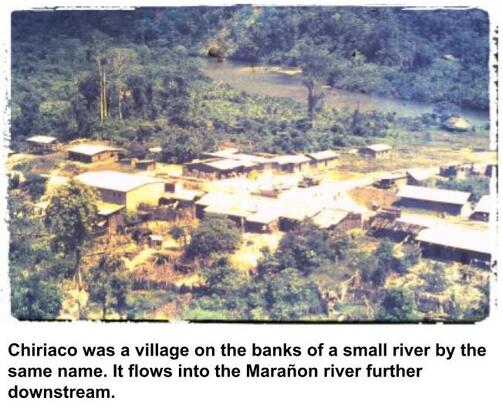
Chiriaco was a village with one street, and the population consisted mostly of Spanish-speaking settlers. Most of the houses were built with materials from the jungle such as roofs and walls made from palms. There were only a few houses with corrugated roofs. There was also a “hotel”; a two story brick building. I got a room there, then went out to find something to eat. There were many things for sale along the street in the shade. Some of the people walking around looking at everything were Awajun in their traditional clothing, the women carrying babies on their hips, and older children running around. Some had come up the river from their small villages to shop and to sell their goods. They mostly sold bananas, peanuts, and cassava, but also dried,salted fish and smoked wild boar meat. As they returned home, they would bring home some of the goods from the small shops in Chiriaco.
I found a place to eat that in no way deserved to be called a cafe or restaurant. People at the other tables were loud, and possibly drunk. Music from a turntable with bad batteries added to the noise. I quickly finished the chicken soup I had ordered, and went down to the river to search for a boat ride to Nieva, a larger village further downriver. As the road did not go any further, all further travel would have to be on the river. After talking to several boat owners, I met someone who was going downriver the next morning with a load of gasoline barrels. He was willing to take me, of course, for a small fee.
I found a place to eat that in no way deserved to be called a cafe or restaurant. People at the other tables were loud, and possibly drunk. Music from a turntable with bad batteries added to the noise. I quickly finished the chicken soup I had ordered, and went down to the river to search for a boat ride to Nieva, a larger village further downriver. As the road did not go any further, all further travel would have to be on the river. After talking to several boat owners, I met someone who was going downriver the next morning with a load of gasoline barrels. He was willing to take me, of course, for a small fee.
The water level was luckily not very high today, so the trip through the first rapids went well. I understood from the other passenger, though, that the next rapids were both respected and feared. It's called "Pongo de Maracaibo". Here the river is squeezed together between two cliffs so that the current forms a high ridge in the middle of the river, before subsiding into calmer waters below. Just as we were heading into these rapids, the engine stopped! The owner, who had decided to steer the boat through the rapids himself, turned pale. He pulled desperately at the starting rope to get the engine going again. Just as it started again, it drove the front of the heavily loaded boat down into the water, and a wave crashed over the boat. After some apparent hesitation, the boat decided to float, and we entered somewhat stiller waters. We all scooped the water out of the boat as quickly as possible. We were all soaking wet, and the policeman got busy drying and polishing his pistol. With the rapids behind us, we passed little villages and clusters of houses. Occasionally we passed people rowing or staking their way along the river bank in their carved canoes. This is Awajun territory, but there are also mestizos living in this area. After the rapids, the landscape around us flattened out somewhat, and the river gets wide. Large rock and sand banks often appear unexpectedly, so here it is important to know the river when traveling.
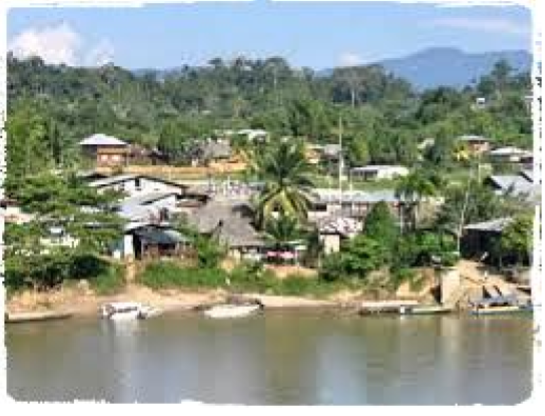
Nieva
After a turn in the river, I saw green, grassy hills with some houses on the slopes. We had arrived at the village of Santa Maria de Nieva. We turned into the river that gave the village its name. Down by the beach there were quite a few houses that we had not seen from the Marañon side. At the top of the hill I could see some nice brick houses with corrugated iron roofs. This was the Catholic Church with its buildings and the boarding school for children from nearby indigenous villages. The school was run by a Catholic mission from Spain who had worked in Nieva for many years. The hotel in the village turned out to be a large hut with palm roof and plank walls. The bed was a bench without a mattress, but I came prepared with an air mattress. It sure came in handy on this trip.
I was hungry after the trip and went out into the village to find something to eat. A little beyond the hotel I found a "pension". A “pension” is a home where the wife cooks for some teachers, police, and other bachelors who work for the state. They pay a fixed amount a week for the food. The woman of the house welcomed me to eat there with them. Nine or ten people sat around a long table inside the house. I settled down at the table while the others continued their conversation and helped themselves to the food. The house had plank walls facing the street, but one side and the back had no walls so I could look straight out to the river. The kitchen was not exactly appetizing. It consisted of a fireplace with some logs lying on an platform of dried clay on the wooden floor and huge pots that had seen better days. All trash was thrown straight out the back, where it had eventually formed a knee-deep mud pit with all sorts of ingredients floating around. Some pigs and ducks were busy rooting around in it. After a bit of waiting, I was served a plate of rice and canned tuna in chopped raw onions and peppers. It actually tasted good despite the surroundings. After I had eaten, they started asking me questions; who I was, where I came from, and where and why I was traveling. I explained why I was here and that I was planning to go up the Morona River. I also told them I was looking for a ride on to Borja, which according to the plan was to be my next stop. One of the teachers was going there the next day and offered me a ride, so we agreed on a departure time the next morning.
After a turn in the river, I saw green, grassy hills with some houses on the slopes. We had arrived at the village of Santa Maria de Nieva. We turned into the river that gave the village its name. Down by the beach there were quite a few houses that we had not seen from the Marañon side. At the top of the hill I could see some nice brick houses with corrugated iron roofs. This was the Catholic Church with its buildings and the boarding school for children from nearby indigenous villages. The school was run by a Catholic mission from Spain who had worked in Nieva for many years. The hotel in the village turned out to be a large hut with palm roof and plank walls. The bed was a bench without a mattress, but I came prepared with an air mattress. It sure came in handy on this trip.
I was hungry after the trip and went out into the village to find something to eat. A little beyond the hotel I found a "pension". A “pension” is a home where the wife cooks for some teachers, police, and other bachelors who work for the state. They pay a fixed amount a week for the food. The woman of the house welcomed me to eat there with them. Nine or ten people sat around a long table inside the house. I settled down at the table while the others continued their conversation and helped themselves to the food. The house had plank walls facing the street, but one side and the back had no walls so I could look straight out to the river. The kitchen was not exactly appetizing. It consisted of a fireplace with some logs lying on an platform of dried clay on the wooden floor and huge pots that had seen better days. All trash was thrown straight out the back, where it had eventually formed a knee-deep mud pit with all sorts of ingredients floating around. Some pigs and ducks were busy rooting around in it. After a bit of waiting, I was served a plate of rice and canned tuna in chopped raw onions and peppers. It actually tasted good despite the surroundings. After I had eaten, they started asking me questions; who I was, where I came from, and where and why I was traveling. I explained why I was here and that I was planning to go up the Morona River. I also told them I was looking for a ride on to Borja, which according to the plan was to be my next stop. One of the teachers was going there the next day and offered me a ride, so we agreed on a departure time the next morning.
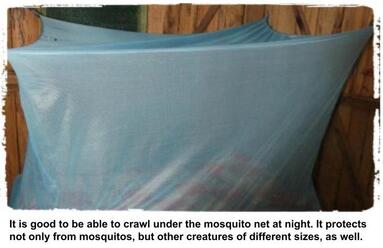
I headed back to the hotel room where I inflated my air mattress, put up my mosquito net, and laid down to sleep. The heat subsided throughout the evening; it actually got pretty cool. Somebody snored terribly elsewhere in the house, and the insects kept a very lively concert that I was not used to. But the night passed without any other adventure than seeing the rats running around on the rafters. It was good to have the mosquito net
between them and me.
between them and me.

